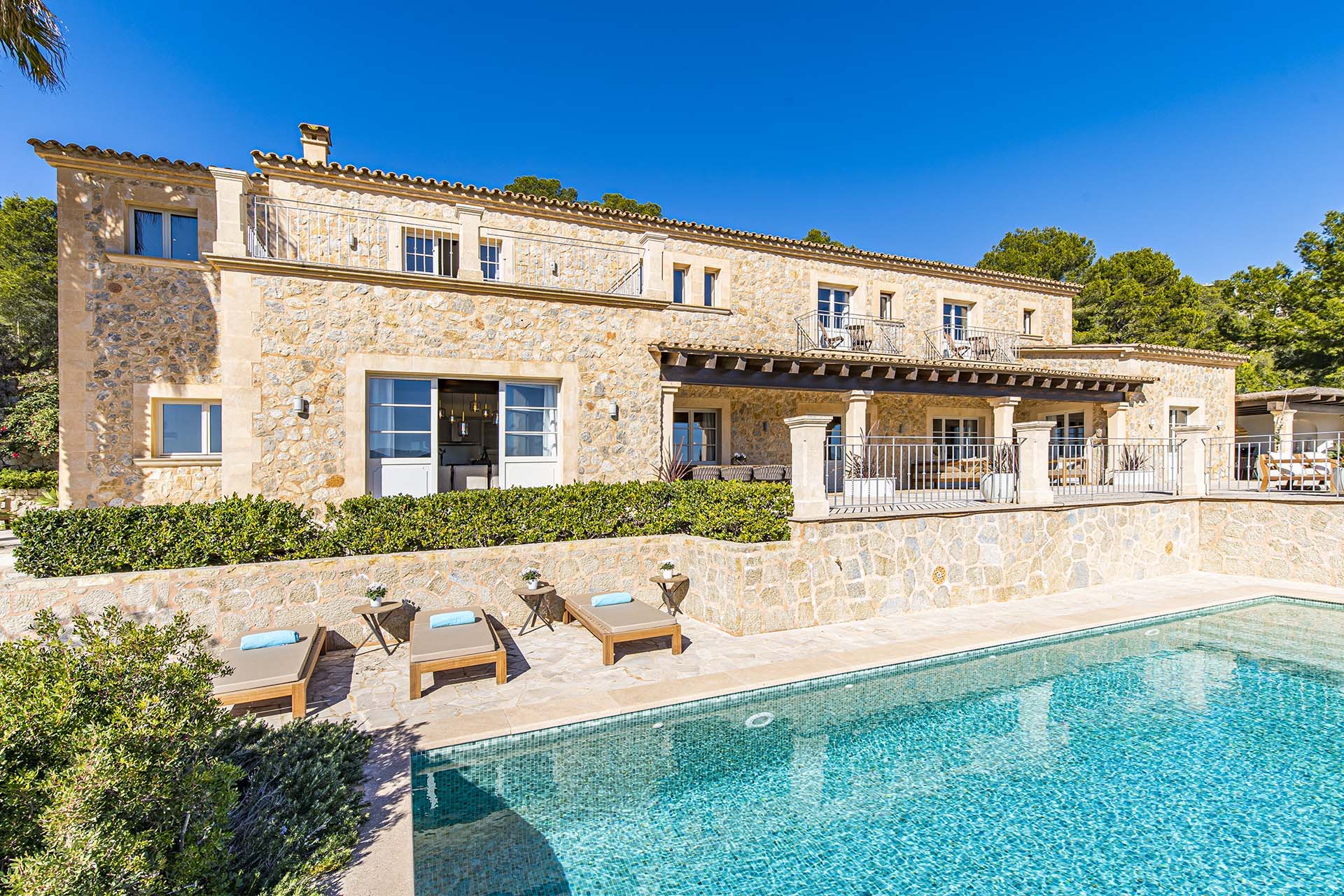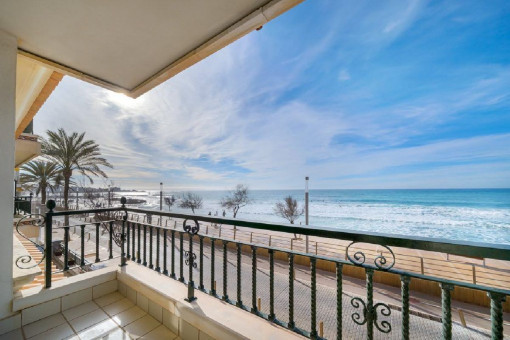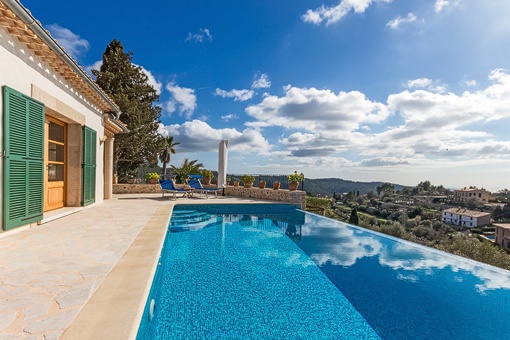The demand for long-term rentals, as well as seasonal rentals in Mallorca, is always high. Porta Mallorquina, as a real estate agent, offers a wide selection of flats, houses, villas, and fincas for long-term on Mallorca.

Long-term rental in Mallorca is becoming increasingly popular – the offer ranges from small flats to prestigious villas like here in Andratx
The demand for long-term rentals, as well as seasonal rentals in Mallorca, is always high. Porta Mallorquina, as a real estate agency, offers an attractive selection of flats, houses, villas, and fincas for long-term and seasonal rental in Mallorca.
Contents
- What should prospective tenants look out for before signing a tenancy agreement?
- What should I bear in mind when viewing a rental property in Mallorca?
- What motives do landlords have for letting their properties in Mallorca on a long-term basis?
- Why do tenants opt for a long-term or seasonal rental in Mallorca?
- What is the difference between long-term hire and seasonal hire?
- What problems can occur with rental contracts in Mallorca?
- What information should a tenancy agreement contain as a minimum?
- What additional costs may be incurred?
- Who is responsible for repairs and replacements?
- What are the advantages of renting through Porta Mallorquina?
What should prospective tenants look out for before signing a tenancy agreement?
Nicole & Roland Schepp, franchise partners of Porta Mallorquina for rental answer the most important questions on this topic:
What should I bear in mind when viewing a rental property in Mallorca?
When viewing a property, it is advisable to arrange an individual appointment in daylight and without time pressure. The property characteristics can be checked based on preliminary information and exposés. A systematic approach during the viewing, entering all rooms and outside areas, and inspecting external rooms and garages are important.

Nicole & Roland Schepp, Porta Mallorquina franchise partners for long-term & and seasonal rentals
The focus should be on the condition of the walls, floors, and windows, as insulation and dampness, as well as an existing heating system, are important issues on the island. Obvious defects should be addressed directly, and questions about furnishings or the move-in date can be clarified on the spot.
The immediate neighborhood and existing infrastructure should also be included in the overall assessment. After the viewing, it is advisable to make a note of the most important points to maintain an overview when selecting several rental properties.
What motives do landlords have for letting their properties in Mallorca on a long-term basis?
Landlords generally aim to generate income from properties they do not use themselves. The properties are often intended to be passed on within the family or sold at a later date.
Flexibility in the decision to sell, tax advantages, and the avoidance of vacancies are also frequent motives for seasonal letting.
Why do tenants opt for a long-term or seasonal rental in Mallorca?
The reasons for renting are varied and many choose to rent in Mallorca for professional, recreational, or trial reasons, to explore the island, to consider potential purchases, or to create a flexible living situation without an immediate property investment.
Long-term and seasonal rental also offers a convenient and cost-effective option for temporary stays and allows a stable presence in Mallorca without having to commit to long-term property ownership.
What is the difference between long-term hire and seasonal hire?
“Seasonal rental” refers to a rental agreement in which the use of a property is for a specific period during a specific season or time of year and is therefore distinct from a long-term rental agreement. This type of rental is purpose-specific, meaning that it is geared towards a specific purpose or use. Reasons why the seasonal rental can be earmarked include, for example, study or training purposes, a fixed-term employment contract or a longer-term holiday home – always while retaining the main residence in the home country.
It is important to note that the exact terms of a seasonal rental, including the duration and months involved, depend on the individual agreements between landlord and tenant. Therefore, all relevant details should be clearly stated in the rental agreement.
In contrast to long-term rentals, seasonal rentals also offer more flexibility, as a long-term rental usually binds the owner for 5 (private individuals) or 7 years (companies).
The choice between long-term rentals and seasonal rentals depends on the individual needs of the tenants and the goals of the landlords. Long-term rentals offer a more stable living situation for longer stays, while seasonal rentals are more geared towards short-term or seasonal needs.
Seasonal hire usually starts from 4 weeks and varies in length depending on the purpose of the hire.
The long-term rental starts from 6 months and the minimum rental period is 12 months.
There are also differences in the cancellation periods:

Apartments in Palma are among the most sought-after rental properties in Mallorca
In the case of a long-term rental, you are committed to 6 months, i.e. you cannot cancel. In the event of cancellation between 7 and 12 months, compensation of one month’s rent is due. From the 13th month onwards, cancellation in due form is only possible.
In the case of seasonal rental, the cancellation period depends on the clauses stipulated in the contract.
What problems can occur with rental contracts in Mallorca?
Communication difficulties due to different native languages between landlord and tenant can lead to misunderstandings in Mallorca. The Spanish version of the tenancy agreement is particularly important, as only this is legally valid in an emergency.
Incomplete tenancy agreements with missing or unclear contractual points are serious. These can relate to the allocation of service charges, community costs and additional costs for garden and pool maintenance. Questions about rubbish charges and Spanish property tax should also be clarified in the contract. The issue of keeping pets should be addressed in advance.
What information should a tenancy agreement contain as a minimum?
A tenancy agreement is a legally binding document that regulates the rights and obligations of both the landlord and the tenant. A complete and worded tenancy agreement should contain at least the following information:
- Identification of the contracting parties:
- Full name and address of the landlord.
- Full name and address of the tenant.
- Description of the property:
- Clear identification of the rental property, including address, flat or house number, floor, etc.
- Rental period:
- Specification of the start and end of the tenancy. In the case of fixed-term tenancy agreements, the exact dates for the start and end of the tenancy should also be specified.
- Rent and payment terms:
- Amount of the monthly rent.
- Due date for rental payments.
- Payment methods (bank transfer, cheque, etc.).
- Indication of ancillary costs, if these are not included in the rent.
- Deposit:
- Amount of the deposit.
- Conditions for the return of the deposit at the end of the tenancy.
- Additional costs:
- Clear list of additional costs that the tenant must pay in addition to the rent (e.g. electricity, water, gas, internet).
- Maintenance and repair obligations:
- Definition of responsibilities for minor repairs and cosmetic repairs.
- Clarification of who is responsible for major repairs and necessary maintenance work.
- Intended use:
- Determining the use of the property, e.g. whether it will be used for residential or commercial purposes.
- House rules:
- If relevant, the rules and regulations governing the tenant’s behavior in and around the property should be listed.
- Terms of cancellation:
- Conditions for the ordinary termination of the tenancy agreement, both for the tenant and for the landlord.
- Subletting:
- If permitted, the conditions for any subletting should be specified.
- Insurance:
- Clarification of which insurance policies (liability, household contents insurance, etc.) the tenant must take out.
- Repairs and renovations at the end of the contract:
- Determination of the condition in which the property must be returned at the end of the tenancy.
- Other agreements:
- Any other special arrangements or agreements made between landlord and tenant.
It is important to emphasize that rental laws and regulations can vary depending on the country and region. It is therefore advisable to take local legislation into account and seek legal advice if in doubt.

Long-term rental of Mallorca properties is in vogue
What additional costs may be incurred?
In addition to the monthly rent, there are often consumption costs for electricity, water, gas or heating oil, telephone/internet connection and annual council tax. Community maintenance costs should normally be included in the rent.
Who is responsible for repairs and replacements?
Landlords are responsible for the functionality and habitability of the property. Minor cosmetic repairs due to normal wear and tear must be carried out by the tenant. At the end of the contract, the tenant must return the property in the same condition, minus daily wear and tear.
What are the advantages of renting through Porta Mallorquina?
Pre-selection from our portfolio saves prospective tenants time and effort. We offer market knowledge of the local market situation and provide information on country-specific conditions. With our support, tenants have an honest broker and personalized advice at their side and receive professional handling.
We will help you find the best rental option for you!
We also maintain long-term relationships with our owners through personal contact and they place their full trust in us.
A network of service providers, such as lawyers, tax advisors and direct contacts to many public authorities round off the service.
Who pays the estate agent’s fees and how high are they?
Depending on Spanish law and the type of rental, the fee is borne by the tenant or landlord.
In the case of long-term rentals, this amounts to 1.7 months’ rent plus VAT (21% IVA), payable by the landlord when the contract is signed.

Our team of experts will help you with all your questions
In the case of seasonal rental, the individual agreements from the rental contract apply.
It is important to emphasize that rental laws and regulations can vary depending on the country and region. It is therefore advisable to take local legislation into account and seek legal advice if in doubt.
Do you have any questions about long-term or fixed-term rentals in Mallorca? The Porta Mallorquina rental team will be happy to answer your comments.

Dear Sir/Madam,
I am requiring a 12 month long term rental in Can Pastilla commencing Mid-October 16.
Can you add me to your email list and send me details of anything you have available please? I am looking at 1/2 bedrooms with an upper rental limit of approx 850 euros.
Thank you for your help
Mrs Karen O’Neill
Dear Mrs. O’Neill, please be so kind and send us your contact details to info@portamallorquina. com. We will then forward your request to our rental agent, who will contact you as soon as possible. Best regards, your Porta Mallorquina Team
Dear Sir/Madam
I & my partner are looking to rent a min 2 bed apt in & around Palma centre or Can Pastilla or Palma Nova areas, The rental limits approx £850.00 GBP per month, We are looking to rent for at least 12 months commencing from mid oct 2017, A sea & beach outlook would be nice, However up to a max of ten ( 10 ) mins walk from the property
Regards John Nicholson.
Dear Mr. Nichoslon,
Thank you for your request. We have forwarded your message and our rental agent will contact you directly in reference to your request.
Best regards,
An elderly friend of mine has been living in Mallorca for 7 years. She has rented a very small flat for the whole of this time and paid cash monthly. She is now paying through her bank and consequently the landlord has asked her to leave and is threatening her. In the UK harrissment of this kind is clear but is there any protection in Spain? Help would be appreciated.
Dear Julia,
thank you for trusting in our company. In this case we would recommend contacting a lawyer. Best regards and a Happy New Year.
Best regards, Your Porta Mallorquina Team